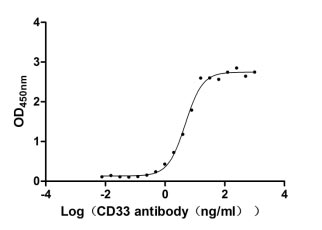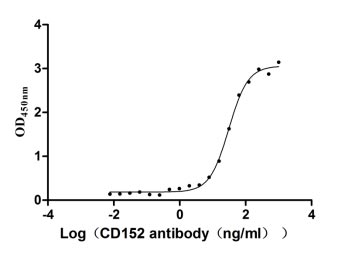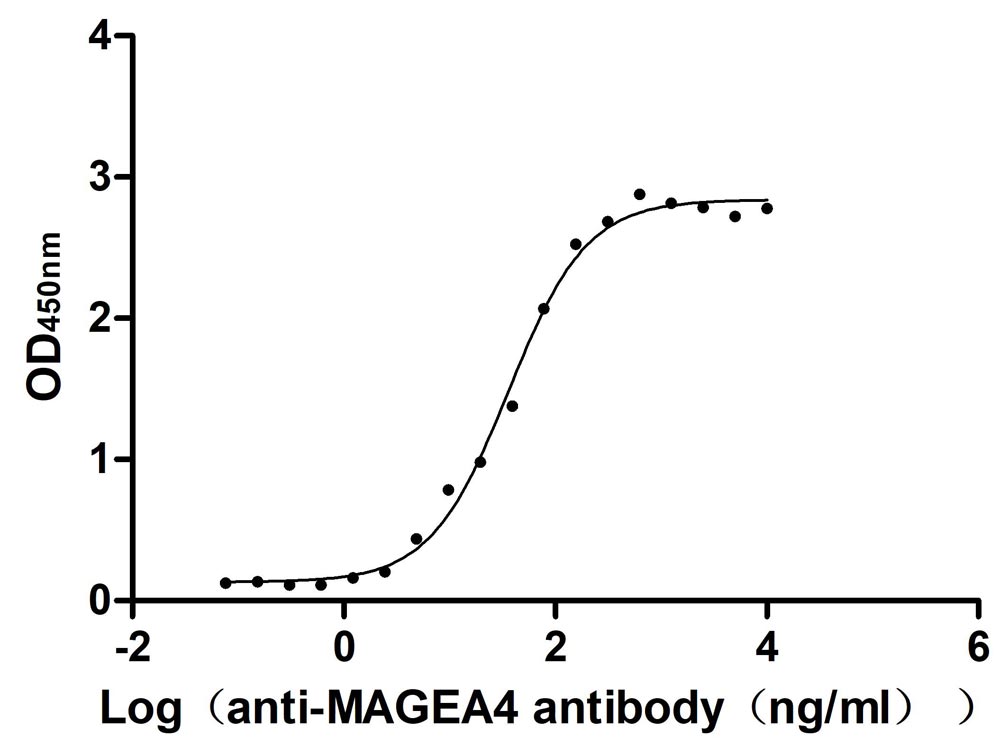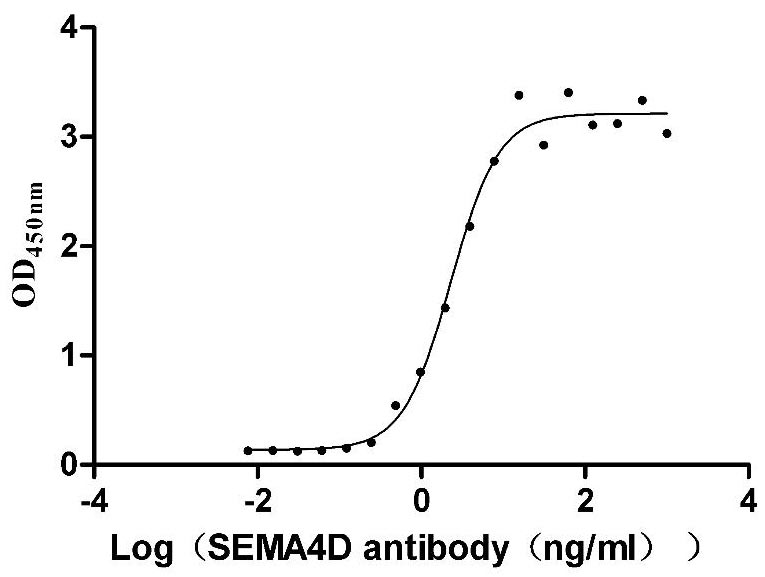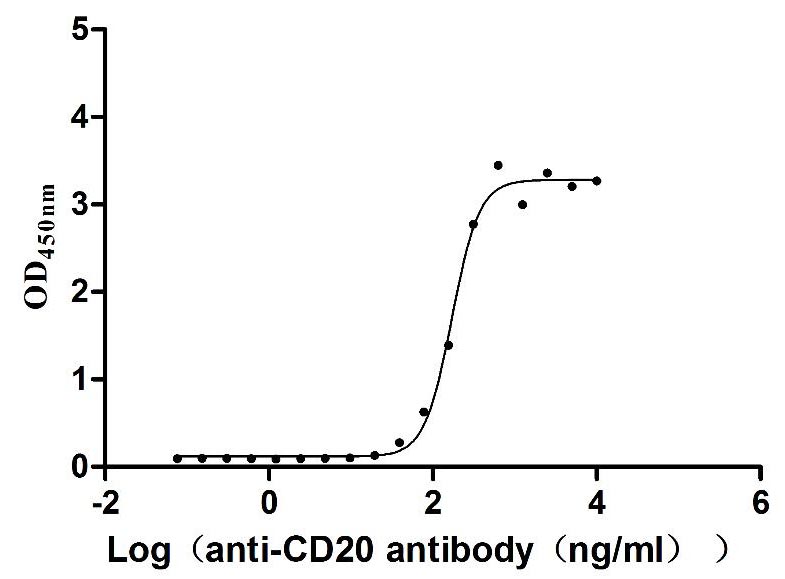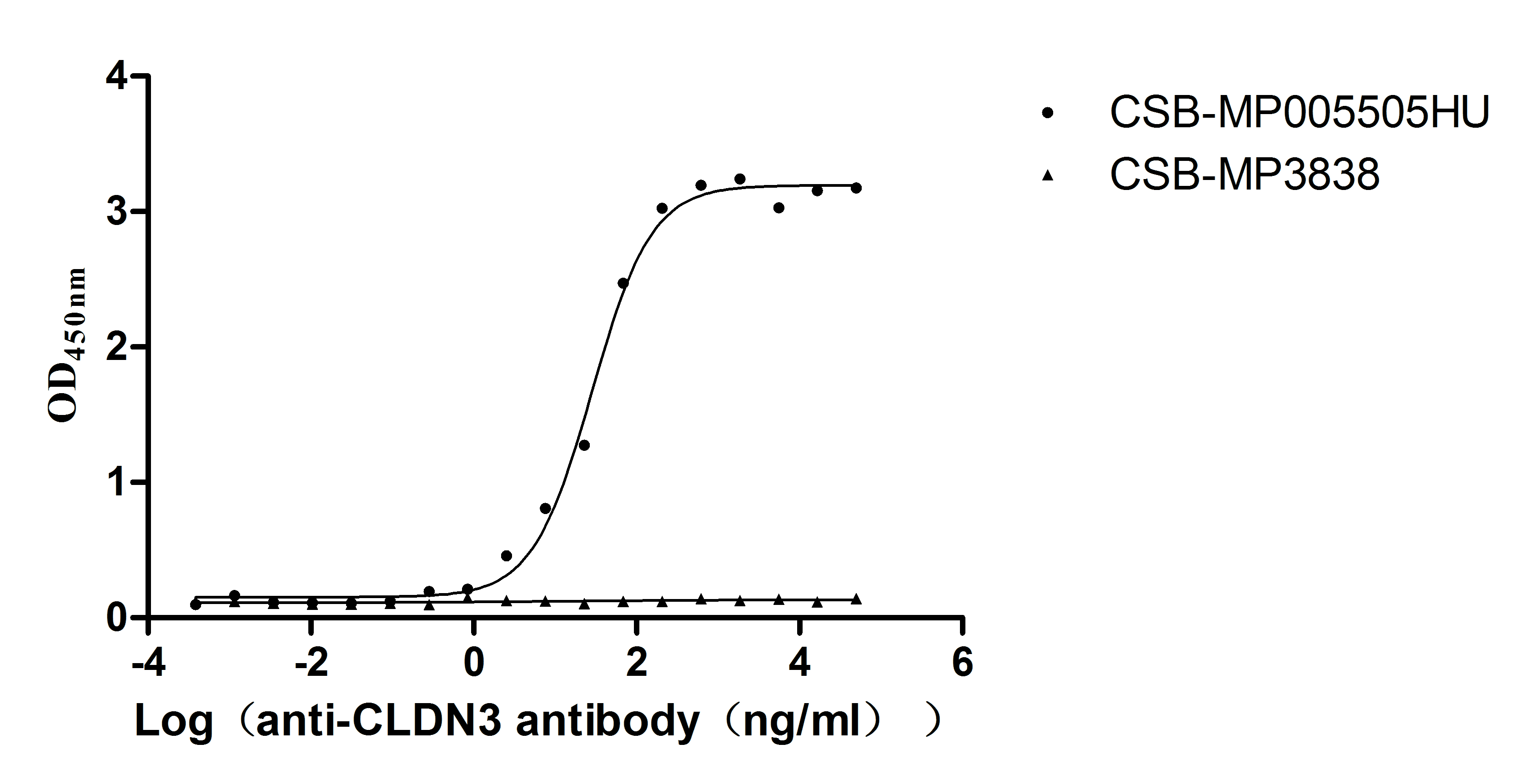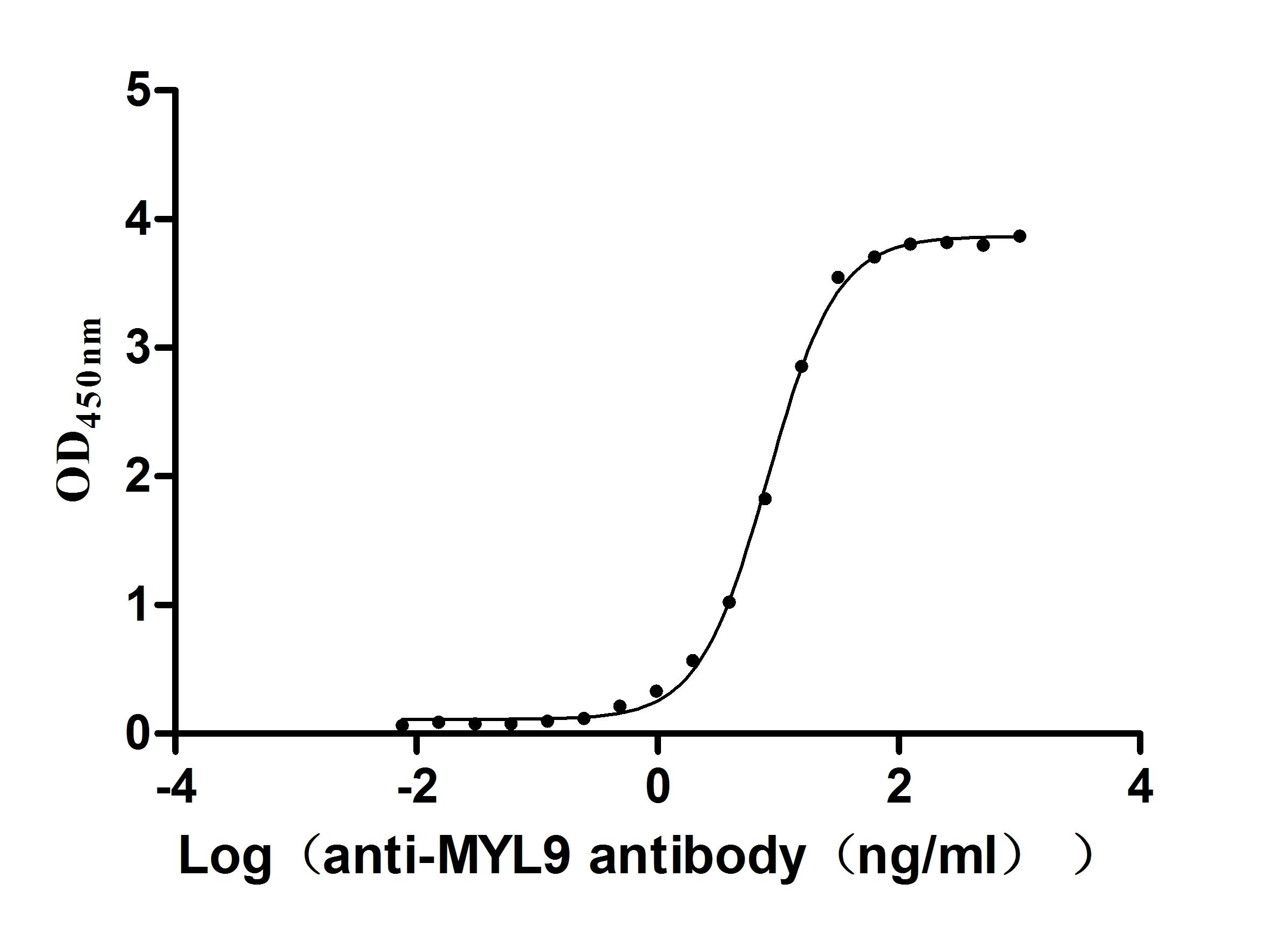Recombinant Mouse Cyclin-dependent kinase inhibitor 1C (Cdkn1c)
-
货号:CSB-YP005088MO
-
规格:
-
来源:Yeast
-
其他:
-
货号:CSB-EP005088MO
-
规格:
-
来源:E.coli
-
其他:
-
货号:CSB-EP005088MO-B
-
规格:
-
来源:E.coli
-
共轭:Avi-tag Biotinylated
E. coli biotin ligase (BirA) is highly specific in covalently attaching biotin to the 15 amino acid AviTag peptide. This recombinant protein was biotinylated in vivo by AviTag-BirA technology, which method is BriA catalyzes amide linkage between the biotin and the specific lysine of the AviTag.
-
其他:
-
货号:CSB-BP005088MO
-
规格:
-
来源:Baculovirus
-
其他:
-
货号:CSB-MP005088MO
-
规格:
-
来源:Mammalian cell
-
其他:
产品详情
-
纯度:>85% (SDS-PAGE)
-
基因名:
-
Uniprot No.:
-
别名:Cdkn1c; Kip2; Cyclin-dependent kinase inhibitor 1C; Cyclin-dependent kinase inhibitor p57; p57Kip2
-
种属:Mus musculus (Mouse)
-
蛋白长度:Full length protein
-
表达区域:1-348
-
氨基酸序列MGMSDVYLRS RTAMERLASS DTFPVIARSS ACRSLFGPVD HEELGRELRM RLAELNAEDQ NRWDFNFQQD VPLRGPGRLQ WMEVDSESVP AFYRETVQVG RCRLQLGPRP PPVAVAVIPR SGPPAGEAPD GLEEAPEQPP SAPASAVVAE PTPPATPAPA SDLTSDPIPE VTLVATSDPT PDPIPDANPD VATRDGEEQV PEQVSEQGEE SGAEPGDELG TEPVSEQGEE QGAEPVEEKD EEPEEEQGAE PVEEQGAEPV EEQNGEPVEE QDENQEQRGQ ELKDQPLSGI PGRPAPGTAA ANANDFFAKR KRTAQENKAS NDVPPGCPSP NVAPGVGAVE QTPRKRLR
-
蛋白标签:Tag type will be determined during the manufacturing process.
The tag type will be determined during production process. If you have specified tag type, please tell us and we will develop the specified tag preferentially. -
产品提供形式:Lyophilized powder
Note: We will preferentially ship the format that we have in stock, however, if you have any special requirement for the format, please remark your requirement when placing the order, we will prepare according to your demand. -
复溶:We recommend that this vial be briefly centrifuged prior to opening to bring the contents to the bottom. Please reconstitute protein in deionized sterile water to a concentration of 0.1-1.0 mg/mL.We recommend to add 5-50% of glycerol (final concentration) and aliquot for long-term storage at -20℃/-80℃. Our default final concentration of glycerol is 50%. Customers could use it as reference.
-
储存条件:Store at -20°C/-80°C upon receipt, aliquoting is necessary for mutiple use. Avoid repeated freeze-thaw cycles.
-
保质期:The shelf life is related to many factors, storage state, buffer ingredients, storage temperature and the stability of the protein itself.
Generally, the shelf life of liquid form is 6 months at -20°C/-80°C. The shelf life of lyophilized form is 12 months at -20°C/-80°C. -
货期:Delivery time may differ from different purchasing way or location, please kindly consult your local distributors for specific delivery time.Note: All of our proteins are default shipped with normal blue ice packs, if you request to ship with dry ice, please communicate with us in advance and extra fees will be charged.
-
注意事项:Repeated freezing and thawing is not recommended. Store working aliquots at 4°C for up to one week.
-
Datasheet :Please contact us to get it.
靶点详情
-
功能:Potent tight-binding inhibitor of several G1 cyclin/CDK complexes (cyclin E-CDK2, cyclin D2-CDK4, and cyclin A-CDK2) and, to lesser extent, of the mitotic cyclin B-CDC2. Negative regulator of cell proliferation. May play a role in maintenance of the non-proliferative state throughout life.
-
基因功能参考文献:
- Cdkn1c expression and methylation may associate with cell cycle exit and differentiation of odontoblasts. PMID: 30014245
- progenitors are dependent on p57(KIP2)-mediated slowing of replication forks for self-renewal, a novel function for cyclin-dependent kinase inhibitors. The switch to differentiation entails rapid down-regulation of p57(KIP2) with a consequent global increase in replication fork speed and an abruptly shorter S phase. PMID: 28560351
- Our data indicate that mouse embryonic stem cells are induced into islet-like cells in vitro. The gene imprinting status of Kcnq1 and Cdkn1c may be changed in differentiated cells during the induction in vitro. PMID: 28926866
- the consequence of elevated Cdkn1c expression on dopamine-related behaviours highlighting the importance of correct dosage of this imprinted gene in the brain PMID: 28857482
- Immunohistochemistry revealed robust p57(kip2) staining in trophoblast giant cells and in the ectoplacental cone at E8.5. p57(kip2) protein was seen in giant cells and throughout the labyrinth, although its abundance was reduced in the junctional zone at E9.5, and became more diffuse by E12.5. PMID: 26988311
- Cdkn1c-luciferase mice offer non-invasive tools to identify factors that disrupt epigenetic processes. PMID: 28147266
- this study identifies E2A target genes in embryonic neural stem cells and demonstrates that E47 regulates neuronal differentiation via p57(KIP2). PMID: 28939666
- This is the first report linking elevated Cdkn1c to altered behaviour in mice. Importantly, the findings from our study may have relevance for Silver Russell Syndrome and highlight a potentially underreported aspect of this disorder. PMID: 27798108
- Dnmt3a-cKO muscles exhibit fewer Pax7+ SCs, which show increased expression of p57Kip2 protein PMID: 27415617
- indicate that the effects of insulin-like growth factor 2 (IGF2) are mediated by direct upregulation of the cyclin-dependent kinase inhibitor p57 (p57). PMID: 26872540
- Data show that transforming growth factor beta (TGFbeta)-induced changes in Gata2 transcription factor and cyclin-dependent kinase inhibitor 1C (P57) expression in hematopoietic progenitors are conveyed through Smad signaling via Smad4 protein. PMID: 26876150
- This study reveals a key requirement for Cdkn1c in the early development of the brown adipose lineages. PMID: 26963625
- Lhx6 and Lhx8 promote palate development through negative regulation of a cell cycle inhibitor gene, p57Kip2 PMID: 26071365
- hepatoblasts in p57(Kip2)-/- mice were highly proliferative and had deficient maturation compared with those in wild-type (WT) mice. PMID: 26165599
- Data indicate that cyclin-dependent kinase inhibitor 1C (P57 was post-transcriptionally regulated by microRNA miR-221 in embryonic stem (ES) cells. PMID: 25086570
- Data show that disruption of potassium voltage-gated channel, KQT-like subfamily Q, member1 (KCNQ1) results in increased expression of cyclin-dependent kinase inhibitor 1C (Cdkn1c) only when the mutation is on the paternal allele. PMID: 26100882
- In the absence of maintained DNA methylation (Dnmt1(-/-)), Cdkn1c escapes silencing demonstrating the requirement for DNA methylation in long term silencing in vivo. PMID: 20372090
- A muscle-specific regulatory element of p57(kip2) directly activated by muscle regulatory factors in myoblasts but repressed by the Notch targets Hes1/Hey1 in progenitor cells, is identified. PMID: 25005473
- The regulation of NSC quiescence by p57 might thus have important implications for the short-term (extrinsic stimuli-dependent) and long-term (age-related) modulation of neurogenesis. PMID: 23481253
- A novel function was uncovered for p57 that integrates external signals transduced by p38 stress-activated protein kinase to control the cell-cycle, establishing a checkpoint in G1 which is critical to permit cellular adaptation to stress. PMID: 22569127
- p57(Kip2) coordinates multiple stages of corticogenesis and exhibits distinct and common activities compared with related family member p27(Kip1). PMID: 21245411
- We particularly focus our attention on p57(Kip2) changes in cancers and pharmacological approaches for modulating p57(Kip2) levels. PMID: 21816904
- Cdkn1c mutants attained a 20% increase in weight during gestation but experienced a rapid reversal of this positive growth trajectory very late in gestation. PMID: 21729874
- The data suggested that p57KIP2 and p27KIP1 control neuronal output for distinct cortical layers by regulating different stages of precursor proliferation. PMID: 22223678
- cooperates with p27(Kip1)to maintain hematopoietic stem cell quiescence through interactions with Hsc70 PMID: 21885020
- Observations indicate that p57Kip2 regulates the activities of E2f1 and p53 to ensure the proper proliferation and survival of cells in the subcommissural organ (SCO) as well as of Pax2-positive cells in the cerebellar primordium. PMID: 21844226
- Cdkn1c, an imprinted gene with expression only from the maternal allele, is the major regulator of embryonic growth in the IC2 imprinted domain on mouse distal chromosome 7. PMID: 17517131
- Data provide evidence that sik1 via p57Kip2 plays a central role in the time clock mechanism that regulates cardiac cell proliferation and differentiation. PMID: 20140255
- Induction of p57(KIP2) expression by p73beta PMID: 11891335
- VEGF has a role in placental hyperplasia of p57Kip2 null mouse embryos PMID: 12482580
- SCFSkp2 complex plays an important role in cell-cycle progression by determining the abundance of p57Kip2 and that of the related CDK inhibitor p27Kip1. PMID: 12925736
- p57KIP2 modulates stress-activated signaling by functioning as an endogenous inhibitor of JNK/SAPK PMID: 12963725
- p57Kip2 influences postmitotic differentiation of dopamine neurons. PMID: 14671317
- p57kip2 mediates proliferative actions of PTHrP in chondrocytes. PMID: 15124025
- p57(Kip2) is involved in the regulation of several aspects of the T cell cycle PMID: 15294951
- Methylation of the 5' DMR plays an important role in the imprinting of the Cdkn1c gene. PMID: 15647320
- There is a marked loss or absence of p57(kip2) expression and high expression of PCNA in hepatocellular carcinoma PMID: 15754413
- Cdkn1c gene expression was analyzed at three different stages in differentiating MyoD(-)C2C12 myoblasts PMID: 15890200
- Maintenance of bone marrow side population cells in G0/G1 may be controlled by gene expression of p57(Kip2). PMID: 16176803
- Recent advances in epigenetic control of the CDKN1C/KCNQ1OT1 imprinted domain in both humans and mice, causing Beckwith-Wiedemann syndrome and cancer. PMID: 16575194
- Hes1 and p57 coordinate cell cycle exit and self-renewal of pancreatic progenitors during an early stage in organogenesis to regulate the number of pancreatic progenitors.They also eliminate cells with aberrant cell cycle characteristics. PMID: 16899237
- Data show that the Notch effector Herp2 is expressed in lens epithelium and directly suppresses p57Kip2 expression, providing a molecular link between Notch signaling and the cell cycle control machinery during lens development. PMID: 17709399
- These data suggest that forced cardiac expression of p57Kip2 does not affect myocardial growth, differentiation and baseline function but attenuates injury from ischemia-reperfusion in the adult mouse heart. PMID: 18312674
- cyclin-dependent kinase inhibitor p57(Kip2) and vascular endothelial growth factor mRNAs are selectively translated by an IRES-independent mechanism under hypoxic stress PMID: 18430730
- p57(Kip2) is an important gene in prostate cancer tumorigenesis PMID: 18483241
- Data show that the minimal promoter element able to confer MyoD responsiveness contains multiple Sp1 and Egr1 recognition sites and that both transcription factors are necessary for the increase in p57 RNA. PMID: 18513743
- C/EBPbeta transactivates p57(Kip2) to promote transition from proliferation to hypertrophic differentiation of chondrocytes during endochondral ossification PMID: 19229324
显示更多
收起更多
-
亚细胞定位:Nucleus.
-
蛋白家族:CDI family
-
组织特异性:Expressed in the heart, brain, lung, skeletal muscle, kidney, pancreas and testis. High levels are seen in the placenta while low levels are seen in the liver.
-
数据库链接:
KEGG: mmu:12577
STRING: 10090.ENSMUSP00000128828
UniGene: Mm.168789
Most popular with customers
-
Recombinant Human Myeloid cell surface antigen CD33 (CD33), partial (Active)
Express system: Mammalian cell
Species: Homo sapiens (Human)
-
Recombinant Human Cytotoxic T-lymphocyte protein 4 (CTLA4), partial (Active)
Express system: Mammalian cell
Species: Homo sapiens (Human)
-
Recombinant Human Melanoma-associated antigen 4 (MAGEA4) (Active)
Express system: Mammalian cell
Species: Homo sapiens (Human)
-
Recombinant Macaca mulatta Semaphorin-4D isoform 1 (SEMA4D), partial (Active)
Express system: Mammalian cell
Species: Macaca mulatta (Rhesus macaque)
-
Recombinant Dog B-lymphocyte antigen CD20 (MS4A1)-VLPs (Active)
Express system: Mammalian cell
Species: Canis lupus familiaris (Dog) (Canis familiaris)
-
Recombinant Human Claudin-3 (CLDN3)-VLPs (Active)
Express system: Mammalian cell
Species: Homo sapiens (Human)
-
Recombinant Human Interleukin-2 (IL2) (Active)
Express system: Mammalian cell
Species: Homo sapiens (Human)
-
Recombinant Human Myosin regulatory light chain 12B(MYL12B) (Active)
Express system: E.coli
Species: Homo sapiens (Human)


